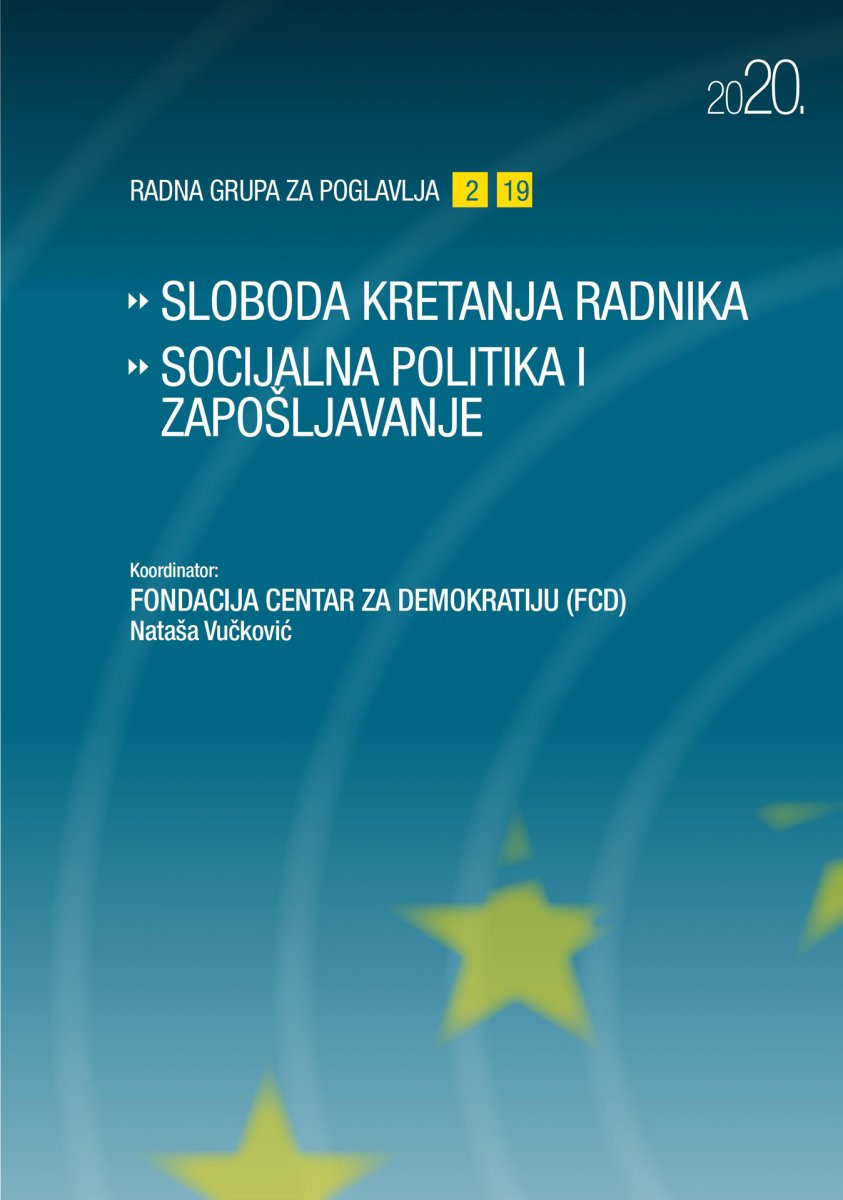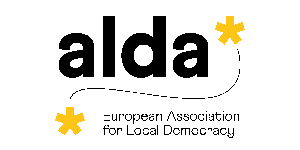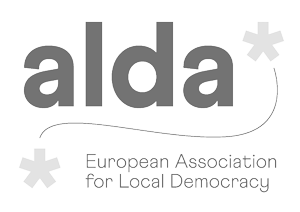Book of Recommendations of the NCEU - Working Group for Chapters 2 and 19
Recommendations of the Working Group for the National Convention on the European Union for Chapters 2 (Freedom of Movement for Workers) and 19 (Social Policy and Employment)
From the Book of Recommendations of the National Convention on the European Union 2020
Working group for Chapters 2 (Freedom of Movement for Workers) and 19 (Social Policy and Employment)
Coordinator:
Center for Democracy Foundation (CDF)
Nataša Vučković
RECOMMENDATIONS OF THE NCEU WORKING GROUP FOR 2021
• Align legislation with the Acquis in the area of freedom of movement for workers, in line with the content and dynamics set out in the NPAA.
• Strengthen administrative capacities, organise various types of employee training in bodies and organisations that deal with social security issues on the topic of introducing and adopting the Acquis and EU regulations.
• Create a unique database and website for job vacancies, that includes job postings and a place where applicants can apply and upload their CVs.
RECOMMENDATIONS OF THE NCEU WORKING GROUP FOR 2021
To repeat certain recommendations from the previous years and to identify those that are new:
• Urgently review the Chapter 19 Action Plan in a transparent and inclusive manner, in direct collaboration with representatives of the social partners, CSOs and independent experts, to address any shortcomings identified in previous comments on its draft and in expert analyses, thus preventing European standards in this area from being inadequately transposed into our legal order;
• Intensify normative activities in 2021 in order to harmonise the domestic legal framework with EU and ILO standards, as well as to regulate new forms of work, in particular, the Labour Law, the Law on Vocational Rehabilitation and Employment of Persons with Disabilities, the Law on Social Protection, Law on Safety and Health at Work, Law on Strike, Law on Gender Equality, as well as amendments to the Law on Financial Support to Families with Children, and to ensure the transparency of the activities of working groups concerning the drafting of laws, and to involve social partners and the NGOs;
• Adopt expired strategies (for example, the Gender Equality Strategy, the Poverty Eradication Strategy, the Social Protection Strategy, the Prevention and Protection Against Discrimination Strategy, etc.), given that most of the strategic documents governing Chapter 19 issues have expired, and to involve all stakeholders, especially the civil sector and the social partners, in the strategic planning process;
• Ratify the International Convention on the Protection of the Rights of All Migrant Workers and Members of Their Families;
• Sign and ratify the Convention on Violence and Abuse (No. 190) of the International Labour Organisation;
• Adopt a Deinstitutionalisation Strategy with an action plan that will contain clearly defined roles in this process, as well as the financial resources needed for its implementation;
• Start drafting a new Employment and Social Policy Reform Programme (ESRP), as a strategy for the development of public policies in the field of social policy and employment that is complementary to the Action Plan for Chapter 19, in accordance with the methodology prescribed in the Law on Planning System of the Republic of Serbia. The new ESRP should be based on the European Pillar of Social Rights, on a human rights-based approach with a gender perspective, in line with the standards of the European Institute for Gender Equality;
• Apply the Law on Social and Economic Council, Article 10, paragraph 1, in particular, of said Law, given that the Social and Economic Council (SEC) does not send all draft laws and proposals of other regulations of importance to the economic and social position of employees and employers until the proposed draft is approved by the Government of Serbia and sent for Parliamentary procedure; it is necessary to accelerate the fulfilment of conditions for the formation of socio-economic councils at the local level, in particular, regarding the development of local organisations, employers' associations and trade unions, their technical and personnel structures, through the increased involvement of local self-government;
• Implement an independent analysis of the effects of applying laws adopted in the previous period, such as the Law on Agency Employment and the Law on Simplified Employment in Seasonal Jobs in Certain Activities;
• To re-establish a Platform through which to monitor the implementation of the Economic Reform Programme (ERP) and the Employment and Social Policy Reform Programme (ESRP);
• Establish a system for monitoring the effectiveness of the protection of certain economic and social rights, the protection of which inspection and judicial bodies are responsible;
• Increase competition transparency in the area of social protection at both the central as local levels;
• Allow for the unhindered functioning of the Government’s coordination mechanisms in the area of Roma social inclusion, for gender equality and for persons with disabilities (in particular those who live in welfare institutions), with the full notification and inclusion of CSOs and relative international organisations.
Center for Democracy Foundation / National Convention on the European Union
For more information (overview and status of the chapters, overview and main assessments, evaluation of previous recommendations of the NCEU working group, etc.) see the complete Book of Recommendations of the National Convention on the European Union (in Serbian).
PUBLICATIONS
 Manual for Strengthening the Capacities of Local Self-Government Units for the Employability of Waste Pickers
Manual for Strengthening the Capacities of Local Self-Government Units for the Employability of Waste Pickers
 NCEU Book of Recommendations 2025
NCEU Book of Recommendations 2025
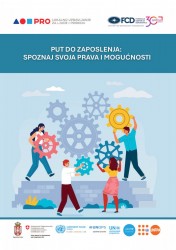 Manual “The Path to Employment: Get to Know Your Rights and Opportunities”
Manual “The Path to Employment: Get to Know Your Rights and Opportunities”
 Challenges for Organising and Collective Bargaining in Care, Administration and Waste collection sectors in Central Eastern European Countries
Challenges for Organising and Collective Bargaining in Care, Administration and Waste collection sectors in Central Eastern European Countries
 Public Policy Proposals – Collective Bargaining (CEECAW)
Public Policy Proposals – Collective Bargaining (CEECAW)
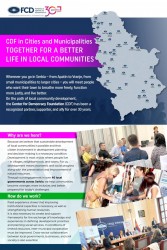 CDF in Cities and Municipalities: Together for a Better Life in Local Communities
CDF in Cities and Municipalities: Together for a Better Life in Local Communities
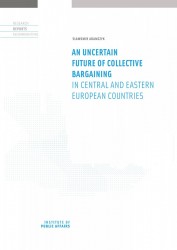 Comparative reports on collective bargaining - CEECAW
Comparative reports on collective bargaining - CEECAW
 POLITEIA – Regional School for Youth Participation 2025 (leaflet)
POLITEIA – Regional School for Youth Participation 2025 (leaflet)
 Report on the State of Labour Rights in the Republic of Serbia in 2024
Report on the State of Labour Rights in the Republic of Serbia in 2024
 Unlocking Collective Bargaining Power in Three Sectors: A Call to Action
Unlocking Collective Bargaining Power in Three Sectors: A Call to Action
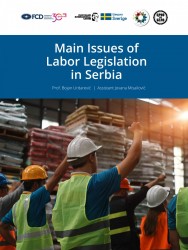 Main Issues of Labor Legislation in Serbia
Main Issues of Labor Legislation in Serbia
 New Monitoring Report by the “SDGs for All” Platform: Is the End Goal in Sight?
New Monitoring Report by the “SDGs for All” Platform: Is the End Goal in Sight?
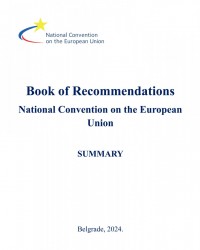 NCEU Book of Recommendations 2024 (Summary)
NCEU Book of Recommendations 2024 (Summary)
 National reports on collective bargaining in Serbia - CEECAW
National reports on collective bargaining in Serbia - CEECAW
 The Comparative Analysis of Youth Policies in the Western Balkans (WB)
The Comparative Analysis of Youth Policies in the Western Balkans (WB)
 Unlocking Collective Bargaining Power in Three Sectors: A Call to Action
Unlocking Collective Bargaining Power in Three Sectors: A Call to Action
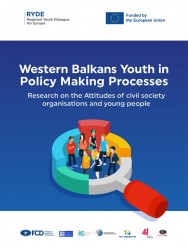 Western Balkans Youth in Policy Making Processes
Western Balkans Youth in Policy Making Processes
 SDGs for All Platform newsletter (December 2023)
SDGs for All Platform newsletter (December 2023)



